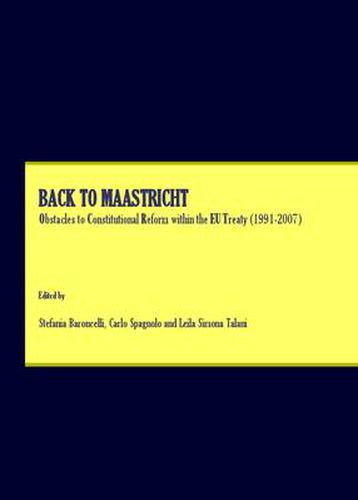Readings Newsletter
Become a Readings Member to make your shopping experience even easier.
Sign in or sign up for free!
You’re not far away from qualifying for FREE standard shipping within Australia
You’ve qualified for FREE standard shipping within Australia
The cart is loading…






European integration has long defied previous notions of state sovereignty and has since the days of the Coal and Steel Community been conferred with original supranational instruments. Yet the Treaty of Rome did not raise the same popular reactions as the Maastricht Treaty about the infringement of national sovereignty. This book suggests that the end of the Cold War has modified the functions of European integration so that the original ideals of integration have lost part of their appeal; hence the birth of the European Union can be regarded as an attempt to seek a new legitimacy. How far did the EU Treaty meet this unprecedented challenge?This book argues that the Maastricht Treaty established a constitutional framework for a new kind of polity without resolving the issue of its purpose and scope. The volume seeks thus to explain some of the reasons for the defeat of the Constitutional Treaty in 2005 dating them back to the Maastricht Treaty. In so doing, the book links the actual state of European integration with the decisions taken at Maastricht in five different realms of supranational policy-making. The first is the constitutional setting of the EU Treaty and its effect on national constitutional law; the second is the concept of governance and the changes introduced by the Economic and Monetary Union; the third is the historical background of the Maastricht agreement; the fourth the political economy of the Economic and Monetary Union; the fifth is the impact of European citizenship in the recent case-law of the European Court of Justice and the prospects of a EU politicisation.The book puts in perspective the solutions to the recent stalemate of the European integration process offered by the Lisbon Treaty.
$9.00 standard shipping within Australia
FREE standard shipping within Australia for orders over $100.00
Express & International shipping calculated at checkout
European integration has long defied previous notions of state sovereignty and has since the days of the Coal and Steel Community been conferred with original supranational instruments. Yet the Treaty of Rome did not raise the same popular reactions as the Maastricht Treaty about the infringement of national sovereignty. This book suggests that the end of the Cold War has modified the functions of European integration so that the original ideals of integration have lost part of their appeal; hence the birth of the European Union can be regarded as an attempt to seek a new legitimacy. How far did the EU Treaty meet this unprecedented challenge?This book argues that the Maastricht Treaty established a constitutional framework for a new kind of polity without resolving the issue of its purpose and scope. The volume seeks thus to explain some of the reasons for the defeat of the Constitutional Treaty in 2005 dating them back to the Maastricht Treaty. In so doing, the book links the actual state of European integration with the decisions taken at Maastricht in five different realms of supranational policy-making. The first is the constitutional setting of the EU Treaty and its effect on national constitutional law; the second is the concept of governance and the changes introduced by the Economic and Monetary Union; the third is the historical background of the Maastricht agreement; the fourth the political economy of the Economic and Monetary Union; the fifth is the impact of European citizenship in the recent case-law of the European Court of Justice and the prospects of a EU politicisation.The book puts in perspective the solutions to the recent stalemate of the European integration process offered by the Lisbon Treaty.